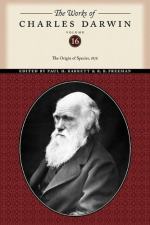We shall, perhaps, best understand how instincts in a state of nature have become modified by selection, by considering a few cases. I will select only three, out of the several which I shall have to discuss in my future work,—namely, the instinct which leads the cuckoo to lay her eggs in other birds’ nests; the slave-making instinct of certain ants; and the comb-making power of the hive-bee: these two latter instincts have generally, and most justly, been ranked by naturalists as the most wonderful of all known instincts.
It is now commonly admitted that the more immediate and final cause of the cuckoo’s instinct is, that she lays her eggs, not daily, but at intervals of two or three days; so that, if she were to make her own nest and sit on her own eggs, those first laid would have to be left for some time unincubated, or there would be eggs and young birds of different ages in the same nest. If this were the case, the process of laying and hatching might be inconveniently long, more especially as she has to migrate at a very early period; and the first hatched young would probably have to be fed by the male alone. But the American cuckoo is in this predicament; for she makes her own nest and has eggs and young successively hatched, all at the same time. It has been asserted that the American cuckoo occasionally lays her eggs in other birds’ nests; but I hear on the high authority of Dr. Brewer, that this is a mistake. Nevertheless, I could give several instances of various birds which have been known occasionally to lay their eggs in other birds’ nests. Now let us suppose that the ancient progenitor of our European cuckoo had the habits of the American cuckoo; but that occasionally she laid an egg in another bird’s nest. If the old bird profited by this occasional habit, or if the young were made more vigorous by advantage having been taken of the mistaken maternal instinct of another bird, than by their own mother’s care, encumbered as she can hardly fail to be by having eggs and young of different ages at the same time; then the old birds or the fostered young would gain an advantage. And analogy would lead me to believe, that the young thus reared would be apt to follow by inheritance the occasional and aberrant habit of their mother, and in their turn would be apt to lay their eggs in other birds’ nests, and thus be successful in rearing their young. By a continued process of this nature, I believe that the strange instinct of our cuckoo could be, and has been, generated. I may add that, according to Dr. Gray and to some other observers, the European cuckoo has not utterly lost all maternal love and care for her own offspring.




